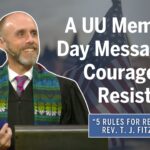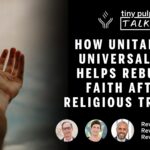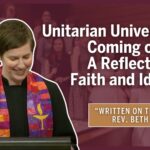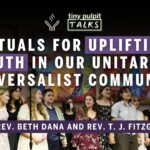Sacred Geography: Flow | Rev. Dr. Daniel Kanter | 03.10.24

We know when we are in the flow. This Sunday we explore what flow means in regards to our spiritual lives. This sermon is part of our Sacred Geography sermon series, where we are locating sacred touchpoints in our inner world and the world around us.
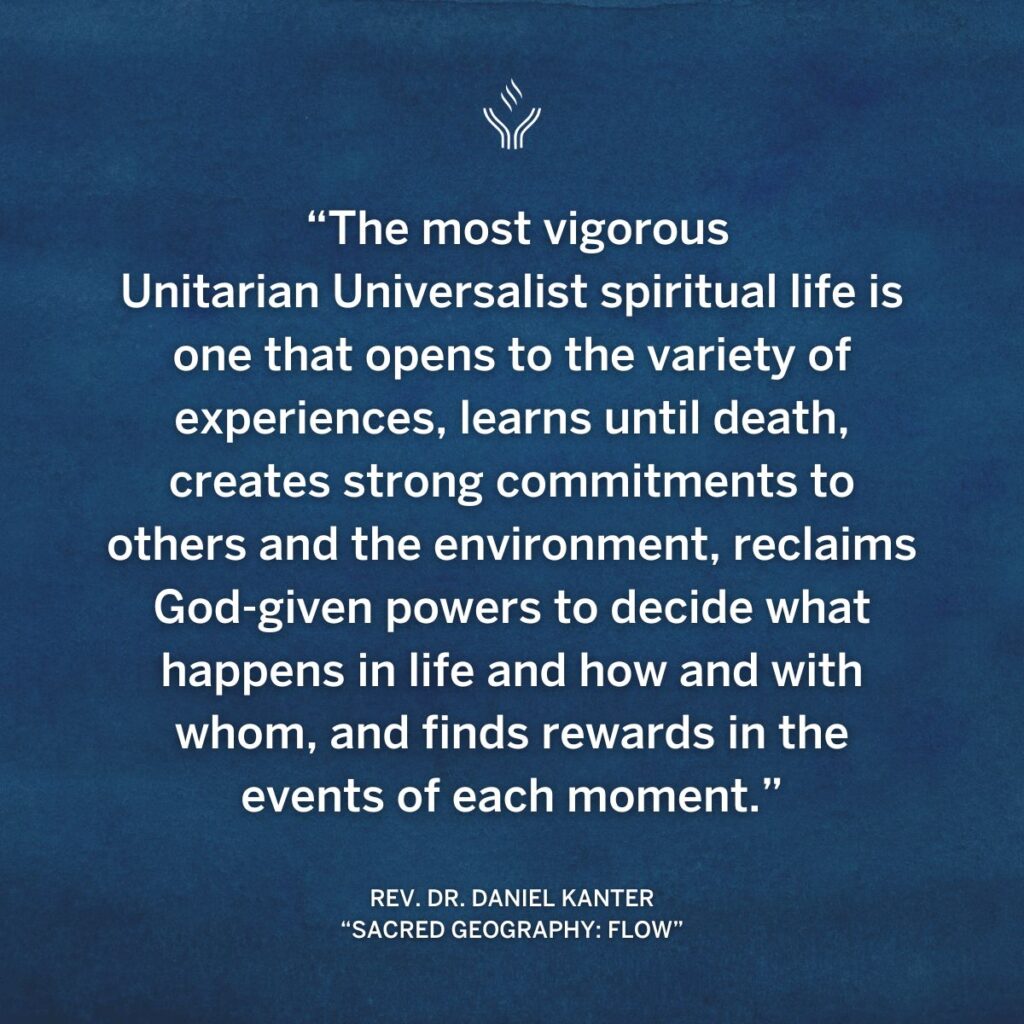
Sermon Transcript
I always understood this hymn that we just sang this morning – “My life flows on an endless song above Earth’s Lamentations. I hear the real though far-off hymn that hails a new creation. How can I keep from singing?” as a Quaker hymn sung outside prisons and cells of enslaved people being sold in auctions. It was in fact published after the Civil War and written by a Baptist, although adopted by Christians and Quakers and Unitarians, who in times of trouble have sung these words. And even when the world seems fractured and laments, life flows on in endless song, hailing a new creation, a new possibility.
They called America the New Jerusalem, the new shalom, the new peace. The desire, the American roots of people who came here from Europe was that this would be the New Jerusalem, the new ark, the land of possibility, though fraught with greed and land grabbing and violent encounter. The theological kernel of the Europeans who arrived at our shores was this, to create the new Salem, the new shalom. It was the hope that drove our country to be the new peace, to be the new Sale, shalom. To my count, 36 states have towns called Salem.
And it seems a tall order in today in our state of disunion in our country rattled with conspiracy and division where martyrs are created to rally for political wins and our world is racked by proxy wars. But when I lose faith, I sing the words of the old Quaker-Christian-Unitarian hymn. My life flows on in endless song above earth’s lamentations. And I listen for the hymn that is far off, but hails a new creation. And I think about whether my life is flowing along an endless song or not.
Sometimes. Sometimes those songs are the songs we sing here on Sunday morning. Sometimes they are the songs of the Sex Pistols and The Clash when I am enraged. At my best, the song that flows through me are the R&B songs of Aretha and Martha and Gaye. But I digress.
Embracing Life’s Flow
What am I really talking about here is how life moves like a river, forever and ever through hell and high water and peaceful waters of life.
I should point out that the third verse in our hymn today, “When tyrants tremble as they hear the bells of freedom ringing, when friends rejoice both far and near, how can I keep from singing to prison cell and dungeon vial? Our thoughts to them are winging. When friends by shame are undefiled, how can I keep from singing,” was not written in the 19th century. It was written in the McCarthy era to protest the round of paranoia and fear that was taking over our country.
How can I keep from singing? And the bigger picture here is the endless song that after we are gone, this song of hope and resistance can continue. And I had buried enough people in this church to know that some of them are still in my endless song. And if I had any concerns about the afterlife, I just know that what I do and say lives in some part hopefully in you and in my children and in my family for as long as it has to. And I know that the other way this endless song of my life continues is in the real and motivating force that I am all things I have ever been just this version of them.
There’s a lovely story I have quoted before in this church about a girl who’s turning 12 and she says, “But I’m also 11 and 10 and 9 and 8 and 7 and 6,” et cetera. And I think, how true is this? I am 56, but I am also 55 and 54 and 53 and 33 and 12, and all the accumulation of who I have been. The story says the way you grow old is kind of like an onion or like the rings of a tree trunk.
Some days you want to curl up and hug a pillow, and that’s like when you were 11, and some days you’re ready for anything, and that’s like when you were 25. And that is how it is. And what all this asks of me is that if I am all the things I have ever been and I extend into the future like some endless song, then what am I doing to make meaning of my life, to be grounded, to cultivate something important?
Making Meaning in Life
A new member of the church asked me last week, “Well, what is salvation for Unitarian Universalists?” Good question. I said, “I think it’s just that when you come to the end of your life, you did everything to live a life of integrity, to live without regret or fear, having made of your life what you could to contribute the best you could to those around you. Salvation,” I said. And I was wrong because I left something off, and that is that salvation also means that we make meaning of things in our lives and we make things right with others.
We repair and restore and repent of those things we have broken. And in order to do that, it means that we have to have a deep understanding that life is not only the accumulation and building of wealth, it’s about making meaning in our lives. There are so many models for this. You might have them in your families or in your study. One person who is the image of meaning making to me is now a dead psychologist who survived the concentration camps of World War II and wrote about it, Viktor Frankl and his life story, both an inspiration.
And there’s some questions about what he exaggerated, but what I know about him was that he was a psychiatrist in a hospital in Vienna before World War II working in the pavilion for suicidal women, where for over four years he treated 3,000 patients a year. Talk about lamentation and that endless song. In 1940, he was the head of neurology at Rothschild Hospital. It was the only hospital in Vienna that still was admitting Jews. Frankl had gained such professional recognition that he had the opportunity to escape Vienna as a Jew. He was issued a visa even.
He and his wife were expecting and the idea of emigrating was appealing, but he was torn about leaving his parents. And on a visit to his parents’ home, his father showed him some marble carvings that he had rescued from a Nazi-destroyed synagogue. And when Frankl looked at the inscriptions on the stones, they were part of the 10 Commandments that said, “Honor thy mother and father,” and he let his visa expire. Frankl and his family then found themselves in a ghetto, and then he was still working with suicidal patients.
He organized a suicide prevention group to serve as what he called shock absorbers for new detainees arriving at the train station. Frankl then spent three years in four camps. He lost his father, his brother, his mother, and his wife, and he survived to return to Vienna. And when he returned to Vienna, he found nothing left of his life or the people he loved.
Viktor Frankl’s “Man’s Search for Meaning” and his philosophy on purpose and responsibility
So he focused on his work and he devoted a single chapter to his time in the concentration camp when he published a book that was called A Psychologist’s Experience in the Concentration Camps under a pseudonym published in 1946 in Germany. The English translation of this book became to be known as Man’s Search for Meaning published in 1959. He wrote it in nine days. And he saw this work not as a personal achievement, but as a symptom of the mass neurosis of modern times since its title promised to deal with the question of life’s meaninglessness, man’s search for meaning.
In which he wrote, “Don’t aim at success. The more you aim at it and make it a target, the more you are going to miss it. For success like happiness cannot be pursued. It must ensue as the unintended side effect of one’s personal dedication to a greater cause than oneself.” His cause was meaning-making, orienting one’s attitude to what I would call the flow of life. And he pointed in the direction of a deep satisfaction that only comes when we stop pursuing things that might satisfy temporary urges for things that work toward a greater good.
And in one way or another, what he was saying was, in our lives we don’t control a lot. We don’t control our ancestors. We don’t control our families. We don’t control how tall or short we are, if we have a baritone voice or a nasally voice like I have, if we are born into poverty or born into wealth, if we are white, black, or otherwise. Our genes instruct who we are. What period of time we are born into is not ours to control. What we do control is who we spend time with, what causes we care about, what jobs we take, what intentions we make in our lives.
In all this soupy mix of life, one thing is true with or without our intentions. Sometimes we feel that deep grounding, that deep peace, that riding the bull home, that feeling of exhilaration, that deep sense of enjoyment and groundedness and presence and peace, that at oneness the painter feels with the brush, the athlete with the ball. This is me speaking now, not Frankl, the parent with the child, the lover with the beloved. Like our ancestors, this is something often not in our control, but rather something we set ourselves up to experience these moments of clarity.
I always say when I’m teaching meditation class, you made it a choice to sit in this class, to sit here and to face yourself in meditation maybe for its peacefulness or just to confront yourself better. The alternative is you could be falling off a barstool right now, but you aren’t and you aren’t. You’re in worship for what? To be nurtured, to be held, to be swept up in a fire of hope, to be challenged to be who you are, to be embraced for who you are, to be shown the way toward God. These can happen.
They happen, right? And there are moments in our lives of change, moments of epiphanies about who we are and what we’re called to do, moments where we glimpse salvation. And they can happen here in church. They can happen at the kitchen sink doing the dishes or on mountaintops. They are mountains that define us or ask us who we are, but they don’t happen necessarily by accident. They happen more so when we intend to understand who we are.
Frankl in his book again said, “It did not really matter what we expected from life,” talking about living in the concentration camps, “but rather what life expected from us. We needed to stop asking about the meaning of life. Instead, to think of ourselves as those who were being questioned by life daily and hourly. Our answer must consist not in talk and meditation, but in right action and in right conduct. Life ultimately means taking the responsibility to find the right answer to its problems and to fulfill the task which it constantly sets for each individual.”
Answering the Call
Now, I’m not the model for all this, but I do know something about it. One of the main reasons I am standing here talking to you right now is because I listened to an answer to what my life should be when I was 22 years old. Pursuing the exotic, living in India, considering being a monk in Buddhism, sitting on a snowy boulder at 14,000 feet on the border of Nepal and Tibet, I was asking the universe what my purpose was. And in my listening in that moment, I will never forget, I’ve written about it, I’ve told you some about it, I heard the words in my ear, “Return home and serve your people.”
Now, it took a while for me to return home and it took a while for me to find my people. It took a while to return home not only to who I was, but to the community that would hold me. It took a lot to continue to challenge myself, and it does even today about where home is and who my people are and what I serve. The easy answer is I serve you and I serve Unitarian Universalists in this church, but it’s also Dallas and those who have asked for my help and those in need who have lost rights that I have worked so hard to serve and more.
The one thing I know about that moment in the mountains, which I call my calling, was that at the moment I was really stretched. I was stretched about my identity in the world, stretched by the snowstorm that had enveloped my campsite in the middle of nowhere on the edge of the highest peaks in The Himalayas, maybe stretched by a lack of oxygen, I admit, but it was the stretch that opened me to listen. When body and mind are stretched to the limits, it often means we are called to the difficult and worthwhile. I’ve seen it so many times in this church.
When a spouse or a child dies or an illness recedes or an addiction is addressed, opportunities transform and present themselves. And it doesn’t have to be hitting bottom as our recovery people will say. It can also be heights of ecstasy or love or clarity that often come in stretched places and rarely in uncomfortable ones. And the fact is we can make these moments happen. Every challenge to expand your life, every ache from a discipline you put yourself to, every time you try to get control of some part of your life you know needs attention, yes, it can be painful, but it can also be freedom.
Living with Intentionality
Jonathan Haidt in his book, The Happiness Hypothesis, says this. He says, “The most apt metaphor for thinking about a human mind is of the human rider sitting atop of an elephant. The rider, representing reason, can do her best to attempt to direct the elephant, but the elephant, representing emotion, is far more powerful and has its own will. It will only comply with the rider’s commands if those commands are not in conflict with its desire.” And I would add, if there is a ground purpose that the rider finds. So what controls this moment? How do we get into the flow?
In my life it’s a few things. It’s putting myself in proximity of the needs of others. It’s testing my ability or stretching relationships or meaningful work. It’s asking myself what repairs I must make in relationships that I have. Where does my longing for wholeness call me? Those might be the only spiritual questions you need this week. The flow of life happens in those moments you make the decision to push yourself toward your life’s purpose, and the result can be happiness and bliss and connection and God, whatever you want to call it.
It is also the source of revelation through history. The thing that theologian Friedrich Schleiermacher said when he said we can experience the infinite and the finite connection flow the spirit that moves us to do and be for others. And what I would say to you today is that the most vigorous UU spiritual life is one that opens to the variety of experiences learns until death, creates strong ties and commitments to others and the environment and reclaims the God-given powers to decide parts of life of what happens and how and with whom and finds rewards in the events of each moment.
Because part of this endless song that we are in is the job of finding joy in this ongoing stream of experience in the process of living, addressing the power that we give away to be comforted or defined by the world that fades in a power when we claim the rewards that are not relegated to outside forces, but look like intentional meaning-making in our lives. Paths of liberation is what I’m talking about here. They’re earned through trial and error of measured in commitments to serve and be grounded and to repair what we have broken.
Embracing Responsibility and Harmony
It is not just the pursuit of happiness I am talking here, which Frankl said was a self-defeating goal. He believed that freedom needs responsibility. Otherwise, life threatens to degenerate into mere arbitrariness. And that freedom, that riding the elephant on the endless song that hears the earth’s lamentations and the new creation hymn in the distance means that we do three things. We create meaning, which is purpose, we live with intentionality, and we embrace the harmony of life. We see things in our lives fitting together as a coherent effect on ourselves and the people around us.
Friends, you are the flow of time. You are the culmination of all the birthdays you’ve ever had, the hope of your ancestors, the person who’s sitting here in this sanctuary. Your only job is to create meaning, connection, and what good you can do for your own salvation, but also accepting that salvation is not something given to you by an act of God, but worked on toward the healing of your life with others, the repair of things you have broken, living into the best spiritual response you can have to all the tumult of the day.
Because in the end, we must sing for all that is our life, we sing our thanks and praise, for all life is a gift which we are called to use to build a common good and make our own days glad. Let that song be sung today and every day in endless song. Amen.



